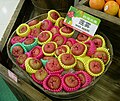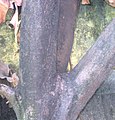| Syzygium samarangense | |
|---|---|

| |

| |
| Conservation status | |
 Least Concern (IUCN 3.1) | |
| Scientific classification | |
| Kingdom: | Plantae |
| Clade: | Tracheophytes |
| Clade: | Angiosperms |
| Clade: | Eudicots |
| Clade: | Rosids |
| Order: | Myrtales |
| Family: | Myrtaceae |
| Genus: | Syzygium |
| Species: | S. samarangense |
| Binomial name | |
| Syzygium samarangense (Blume) Merr. & L.M.Perry | |
| Synonyms | |
| |
Syzygium samarangense is a species of flowering plant in the family Myrtaceae, native to an area that includes the Greater Sunda Islands, Malay Peninsula, and the Andaman and Nicobar Islands, but introduced in prehistoric times to a wider area and now widely cultivated in the tropics. Common names in English include wax apple, Java apple, Semarang rose-apple, and wax jambu.
Description
Syzygium samarangense is a tropical tree growing to 12 m (39 ft) tall, with evergreen leaves 10–25 cm (4–10 in) long and 5–10 cm (2–4 in) broad. The leaves are elliptical, but rounded at the base; they are aromatic when crushed. The trunk is relatively short, with a wide – yet open – crown starting low on the tree. The bark is pinkish-gray in color, and flakes readily.
The flowers are white to yellowish-white, 2.5 cm (1 in) diameter, with four petals and numerous stamens. They form in panicles of between three and 30 near branch tips. The resulting fruit is a bell-shaped, edible berry, with colors ranging from white, pale green, or green to red, purple, or crimson, to deep purple or even black. The fruit grows 4–6 cm (1.6–2.4 in) long in wild plants, and has four fleshy calyx lobes at the tip. The skin is thin, and the flesh is white and spongy. Each berry holds one or two rounded seeds not larger than .8 cm (0.3 in). The flowers and resulting fruit are not limited to the axils of the leaves, and can appear on nearly any point on the surface of the trunk and branches. When mature, the tree is considered a heavy bearer, yielding up to 700 fruits in a crop.
When ripe, the fruit puff outwards, with a slight concavity in the middle of the underside of the "bell". Healthy wax apples have a light sheen to them. Despite its name, a ripe wax apple only resembles an apple on the outside in color. It does not taste like an apple, and it has neither the fragrance nor the density of an apple. Its flavor is similar to a snow pear, and the liquid-to-flesh ratio of the wax apple is comparable to a watermelon. Unlike either apple or watermelon, the wax apple's flesh has a very loose weave. The very middle holds a seed situated in a sort of cotton candy-like mesh. This mesh is edible, but flavorless. The color of its juice depends on the cultivar; it may be purple to entirely colorless.
Composition
Nutrition
| Nutritional value per 100 g (3.5 oz) | |||||||||||||||||||||||||||||||||||||||
|---|---|---|---|---|---|---|---|---|---|---|---|---|---|---|---|---|---|---|---|---|---|---|---|---|---|---|---|---|---|---|---|---|---|---|---|---|---|---|---|
| Energy | 105 kJ (25 kcal) | ||||||||||||||||||||||||||||||||||||||
| Carbohydrates | 5.70 g | ||||||||||||||||||||||||||||||||||||||
| Fat | 0.30 g | ||||||||||||||||||||||||||||||||||||||
| Protein | 0.60 g | ||||||||||||||||||||||||||||||||||||||
| |||||||||||||||||||||||||||||||||||||||
| Other constituents | Quantity | ||||||||||||||||||||||||||||||||||||||
| Cholesterol | 0 mg | ||||||||||||||||||||||||||||||||||||||
Link to Full Nutrient Report of USDA Database entry | |||||||||||||||||||||||||||||||||||||||
| Percentages estimated using US recommendations for adults, except for potassium, which is estimated based on expert recommendation from the National Academies. | |||||||||||||||||||||||||||||||||||||||
Uses
Culinary
Several cultivars with larger fruit have been selected. In general, the paler or darker the color, the sweeter it is.
In Southeast Asia, the black ones are nicknamed "Black Pearl" or "Black Diamond", while the very pale greenish-white ones, called "Pearl", are among the highest-priced ones in fruit markets. The fruit is often served uncut, but with the core removed, to preserve the unique bell-shaped presentation.
In the Indian Ocean islands cuisine, the fruit is frequently used in salads, as well as in lightly sautéed dishes. It is mainly eaten as a fruit and also used to make pickles (chambakka achar).
In the Philippines, its local name is macopa or makopa (its ancient name before colonialism, is dambo). Because of their similarity in appearance, it is often confused with tambis (Syzygium aqueum), although the latter is more commonly cultivated.
Gallery
-
Cross-section of the fruit
-
Fruit packed for sale
-
Fruit in the tree
-
 Fruit for sale
Fruit for sale
-
 Fruit in Puducherry
Fruit in Puducherry
-
 Tree in Puducherry
Tree in Puducherry
-
 Red variety of fruit
Red variety of fruit
-
 Fruit with leaves
Fruit with leaves
-
 Lower trunk
Lower trunk
-
"Black Pearl" wax apple
-
 Fruits of Syzygium samarangense, for sale in West Bengal, India.
Fruits of Syzygium samarangense, for sale in West Bengal, India.
-

-

References
- Botanic Gardens Conservation International (BGCI).; IUCN SSC Global Tree Specialist Group (2018). "Syzygium samarangense". IUCN Red List of Threatened Species. 2018: e.T136144075A136144077. doi:10.2305/IUCN.UK.2018-2.RLTS.T136144075A136144077.en. Retrieved 19 November 2021.
- ^ ‹ The template below (WCSP) is being considered for deletion. See templates for discussion to help reach a consensus. ›
"Syzygium samarangense". World Checklist of Selected Plant Families (WCSP). Royal Botanic Gardens, Kew. Retrieved 16 July 2018.
- ^ Julia F. Morton (1987). "Java apple". Fruits of Warm Climates. Miami, FL: Florida Flair Books. pp. 381–382. ISBN 978-0-9610184-1-2.
- "Syzygium samarangense (Blume) Merr. & L.M.Perry". Germplasm Resources Information Network. Agricultural Research Service, United States Department of Agriculture. Retrieved 14 March 2016.
- ^ "Syzygium samarangense". Singapore National Parks.
- United States Food and Drug Administration (2024). "Daily Value on the Nutrition and Supplement Facts Labels". FDA. Archived from the original on 27 March 2024. Retrieved 28 March 2024.
- National Academies of Sciences, Engineering, and Medicine; Health and Medicine Division; Food and Nutrition Board; Committee to Review the Dietary Reference Intakes for Sodium and Potassium (2019). "Chapter 4: Potassium: Dietary Reference Intakes for Adequacy". In Oria, Maria; Harrison, Meghan; Stallings, Virginia A. (eds.). Dietary Reference Intakes for Sodium and Potassium. The National Academies Collection: Reports funded by National Institutes of Health. Washington, DC: National Academies Press (US). pp. 120–121. doi:10.17226/25353. ISBN 978-0-309-48834-1. PMID 30844154. Retrieved 5 December 2024.
- Janick, Jules; Paull, Robert (2008). The Encyclopedia of Fruits and Nuts. CABI. pp. 552, 553. ISBN 9780851996387.
| Taxon identifiers | |
|---|---|
| Syzygium samarangense |
|
| Myrtus samarangensis | |